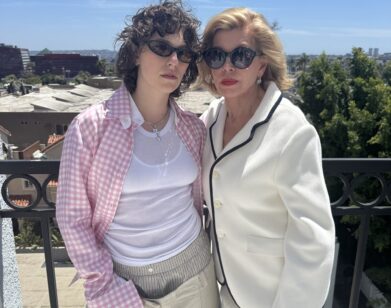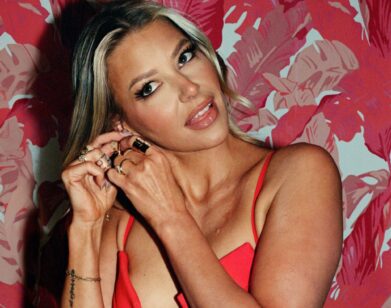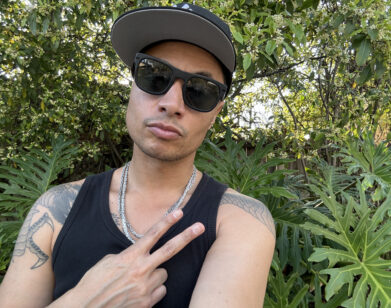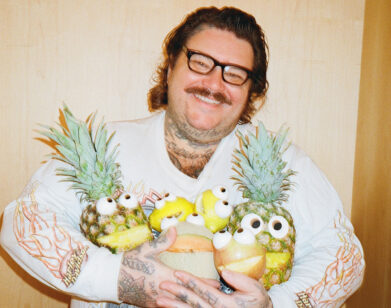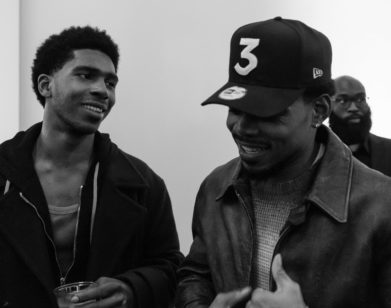Max Kakacek of Whitney Is Listening to Nina Simone, Jack Arel, and The Rugrats
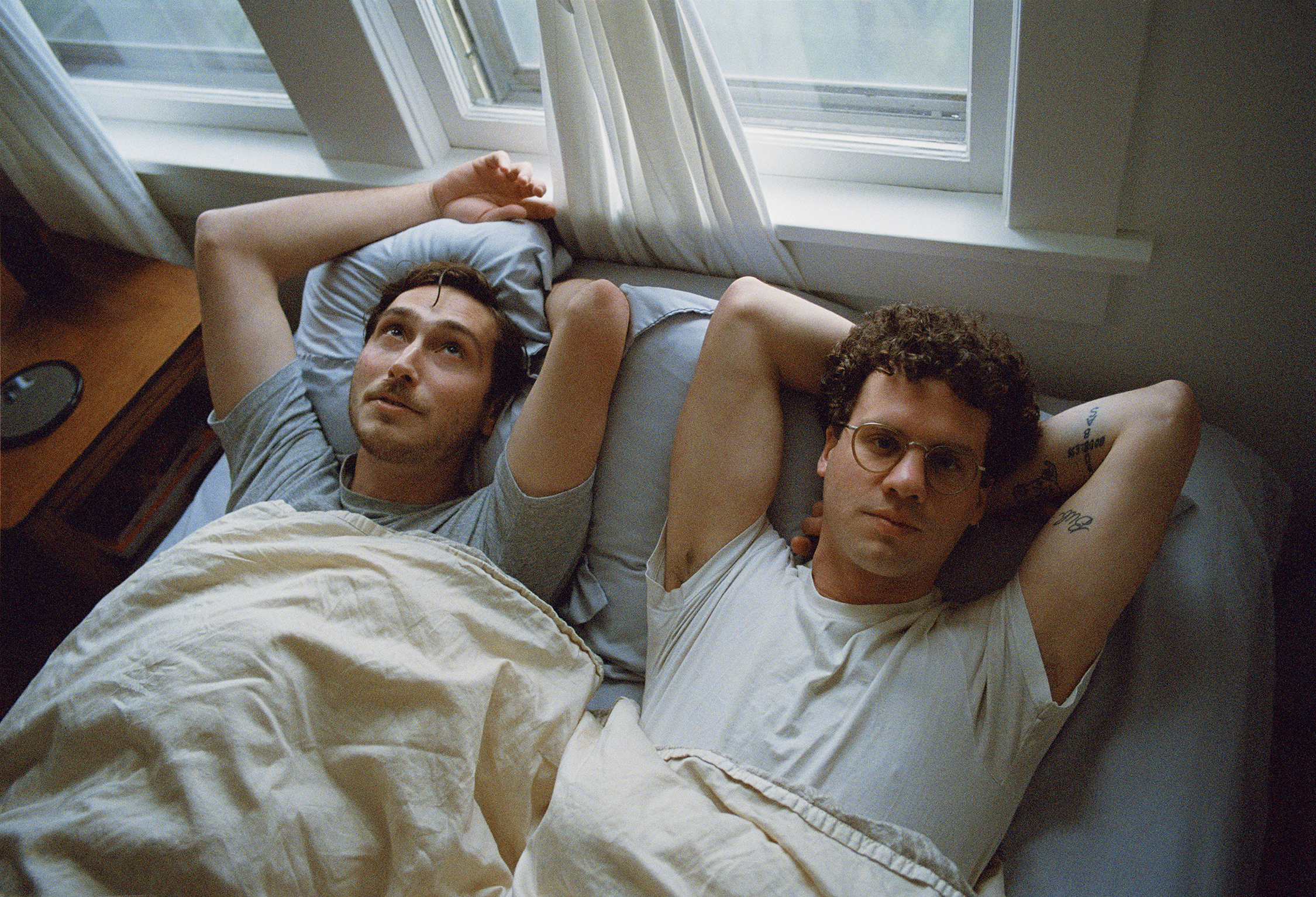
Kakacek (right) with Julien Ehrlich, of Whitney. Photo by Olivia Bee.
This is “Add to Queue,” our attempt to sort through the cacophony of music floating in the algorithmic atmosphere by consulting the experts themselves. Our favorite musicians tell us about their favorite music—the sad, the happy, the dinner party-y, the songs they want played at their funeral. In this edition, we speak with Max Kakacek, one-half of the Chicago-bred, sunny folk-soul-rock band Whitney, upon the release of their new album Forever Turned Around. Kakacek talks “Dad rock,” karaoke, and all his recs, which range from Nina Simone to Leonard Cohen, ABBA to Jack Arel. (All that, and the Rugrats.)
———
KAKACEK: I want to give you a setting right now. I’ve been walking around the track at the Birmingham Downtown YMCA this whole interview. A very funny place to be doing this interview, but we just got to Birmingham a few hours ago, and I’m trying to somehow exercise before I eat a lot of barbecue.
NECHAMKIN: That’s amazing. Thank you for telling me that. What was the last song that you listened to?
KAKACEK: It’s a good one. I’ll jump into my Spotify. It’s kind of a funny morning though, because my girlfriend turned 30 today, so I was making her a playlist. We were joking about how the bus that we’re in right now is about to hit a million miles traveled. So, as a joke, I put on “I’m Gonna Be (500 Miles)” by the Proclaimers. But that isn’t indicative of what I actually listen to at all.
NECHAMKIN: Who have you actually been listening to?
KAKACEK: The last song that I found that I really, really liked is by a band called Love Apple. I think they’re based in Cleveland, Ohio, they must be from the late 60s. It’s this really messed up solo recording called “There’s No Answer Without You.” It’s just a guitar and drums and three female vocalists. To me, it’s the perfect soul, sad, vocal kind of destroyed recording.
NECHAMKIN: Who would you say was the earliest musician to influence you?
KAKACEK: Well, I started playing music from a really young age. I don’t want to, like, exacerbate the issue that has become “Dad rock.” [Laughs.] But when you’re a kid and you are interested in playing music, a lot of the music that you grew up or listened to at your parents’ house … you know, my Dad was a huge Ramones fan, and my mom was a huge Buzzcocks fan, so these were the early ones. But my dad also had some country-leaning tendencies, so Marty Robbins and Johnny Horton were always playing in his car as well. Kind of a mix between punk and just straight-up cowboy country. When I hear those recordings now, it’s pretty nostalgic for me. Looking back at it, I realize how influential they were, but at the time it was just, like, the music surrounded me.
NECHAMKIN: Sort of an unconscious thing?
KAKACEK: Exactly. And then when I started playing music more seriously, with the Smith Westerns and when Whitney became a project, I went back to Marty Robbins and listened to all that country that I’d grown up with and was like man, how can I like bring this into what I’m making more?
NECHAMKIN: What was your first concert?
KAKACEK: Apart from, like, friends’ bands in basements and stuff in 7th and 8th grade in Chicago, which were terrible shows, my aunt had a friend or something and she gave me and my dad tickets to go see The Rolling Stones at United Center. That was my first big concert, but then shortly after that, I saw The White Stripes at the Aragon Ballroom and The Strokes and The Hives in 8th, 9th grade. The Strokes, Hives, Yeah Yeah Yeahs, White Stripes—the whole garage revitalization in the early 2000s were the shows I was going to.
NECHAMKIN: Do you have a favorite movie soundtrack?
KAKACEK: That’s a great question. I just watched City of God again the other day, which has a great soundtrack. The score from Midsommar, the new Ari Aster movie—I thought it was amazing.
NECHAMKIN: I didn’t see it, I’m too scared.
KAKACEK: It’s more, like, shocking. Honestly, for some reason, there are a lot of gems to be found in old Westerns, too. There’s a song that I always put on every playlist that I can only find on YouTube. It’s by Jack Arel, it’s called “Something Happen.” I’m not even sure what movie it was in, but he would do soundtracks for Westerns and weird movies but, like, weird funk. It’s in between funk, country, and Pink Floyd or something. It’s instrumental and everyone that I’ve played it for will just be like, what the hell is this song?
NECHAMKIN: Who’s your all time dream collaborator?
KAKACEK: I’ve been listening to a lot of Nina Simone lately, and I don’t even think I’ve earned the right to be in the same room as that human being, but I would just like to watch the way she writes and try to learn from her. Just being in a room with someone like that—even if I’d be too scared to even say anything. I’ve also always really wanted to do something with Moses Sumney. We played a show together in New York. His voice is just amazing. Actually, the song I brought up by Love Apple, when I first heard it I was like man, I would love to cover this with Moses or something. But that’s a dream, you know.
NECHAMKIN: Do you have a song that always puts you in a good mood, without fail?
KAKACEK: See, that’s just a weird one because I usually only listen to sad music. But it does make me feel better.
NECHAMKIN: I feel like some people say the opposite.
KAKACEK: I usually listen to sad music and get a sense of being in commiseration with someone. One that feels really, really good lately is called “Angels Flying Too Close to the Ground” by Willie Nelson. It’s a country song—straight up, not gonna lie, you know, it’s Willie Nelson. But it’s really beautiful. It’s about essentially being okay with letting someone go and being around them for a short period of time and appreciating that time, but understanding that it has to be gone. And then another one would be “Something on Your Mind” by Karen Dalton, whose voice is just incredible. Just that alone makes me happy.
NECHAMKIN: What would you put on your road trip playlist?
KAKACEK: Probably have to have some Thin Lizzy or something in there, something really rambunctious and kind of funny. Probably Bruce Springsteen, too. ABBA—like “S.O.S.” or their off-kilter disco hits. “The Song” by Sonya Spence—that’s probably not a road trip song; that’s better for a romantic trip.
NECHAMKIN: How about for a dinner party?
KAKACEK: Are we talking about, you know, you sit down and you’re counting on something like in the background to be beautiful and garner conversation? Or you’re singing auto-tune karaoke after eating dinner?
NECHAMKIN: It depends on what kind of party you throw.
KAKACEK: This is not to say this is background music, cause that’s an annoying thing that people who make peaceful music have to go through all the time. Like, “That sounds like a great thing to put on when we’re making dinner.” So I don’t want it to be a slight. But anything by Mulatu Astatke or any Éthiopiques records are just beautiful textures and should be listened to more thoughtfully than being spoken over at dinner. But they also transcend and become a great vibe in the background. If there was a double date dinner party, if I cooked for a long time, having Aretha Franklin or Billie Holiday in the background during a quiet, intimate dinner has always been one of my favorite things. Especially Billie Holiday. Something about it just kind puts you in a different setting completely.
NECHAMKIN: What about a more ravey house party situation?
KAKACEK: Pretty much any time I’m doing that, it’s early 2000s rap. Fabolous, Ashanti, just what I grew up listening to at school dances. Obviously Young Thug. Anything Ja Rule was involved in. That was what dominated my formative party and romance years. And TLC. “FanMail” was one of my favorite songs.
NECHAMKIN: What about a crying in your bedroom playlist?
KAKACEK: Actually, a specific song that I did almost cry to in my bedroom before I left for the tour is a cover of “Don’t Think Twice It’s All Right” by John Martyn. He’s an English singer-songwriter. Just devastating. There is “Holocaust” by Big Star, “Famous Blue Raincoat” by Leonard Cohen… those are all ones that will destroy me. My library is sad music. I’m a little too messed for my own brain. It’s too depressing to even think about because when I was making the mix for my girlfriend today, I was like, all this shit is so fucking depressing, like, do I even have songs that are chronically cute and happy? I didn’t. Oh, “Kill My World” by Autumn. The intro is about a minute long. You have this disclaimer in there, and it’s like a bat wrote it. It’s the most intense music, but once you get past the minute, it becomes this beautiful kind of love song. “Rainbows and Ridges” by Blaze Foley—another classic that speaks of death.
NECHAMKIN: I don’t know if you smoke, but if you were to make a high playlist…?
KAKACEK: All the music I listen to I think is pretty stony. That Jack Arel song “Something Happen” would definitely be on there. I would put weird funk stuff on there, like this song called “Ela partiu” by Tim Maia. I find that one really weird. “My Executive Life” by Jeff Parker is a jazz-inspired kind of groove vibe. I don’t even know how to describe it. It feels so fuckin’ cool. I usually am not a blues person at all, but “Tom Cat” by Muddy Waters. And “Yeah Yeah” by Blackrock. That’s the main one.
NECHAMKIN: If you were to pick a couple of songs to play at your funeral …
KAKACEK: At my funeral? Oh my goodness. I actually have thought about it a little bit. There’s this one called “Streets of Laredo” by Marty Robbins, and it is about dying. Either that or “See You Later I’m Gone” by Robert Lester Folsom. [Laughs.]
NECHAMKIN: Would you want them to play your own music, or would that be too weird?
KAKACEK: That would be weird. I don’t know if there are a lot of artists that agree with me, but I I try not to listen to our music. When we’re writing, I listen to our music all the time. It’s part of trying to figure out what this is, really. But once it’s done, I never really listen to it. Every once in a while. It seems self-indulgent. There’s so much music out there.
NECHAMKIN: A lot of actors talk about how they never watch themselves onscreen.
KAKACEK: Well, there’s just so much from the artists out there to take in and be a part of, whatever they’re trying to do. It seems selfish to listen to something over and over again that you’ve heard and created yourself instead of learning from them.
NECHAMKIN: Favorite karaoke song?
KAKACEK: I’m really scared to sing. That’s why I pretty much express all of my musical ideas playing the piano or guitar, bass. The joke is, in the band, that my karaoke song is “Tequila.” All you do is say “Tequila” every, what, 45 seconds? I’ve done that, but if I had a dream song, and I had the most beautiful voice in the world, it would be “Wicked Game” by Chris Isaak.
NECHAMKIN: So do you sing in the shower?
KAKACEK: I don’t.
NECHAMKIN: Is there an instrument that you’d want to learn how to play that you don’t know?
KAKACEK: That’s a good question. Eventually, I would like to be better at playing drums. There’s something about drummers having a certain style that’s lazy and beautiful, and my style is just kind of pathetic. I can get the heel of just my right foot. It’s weird because I’m a lefty and bizarrely ambidextrous. I write with my right hand, but I do everything else with my left hand, but drums—it’s like my brain hasn’t figured it out yet. I’ve learned most string instruments as I could. I played a little bit of violin in high school. I’ve done banjo and had a brief stint with the guitar, mandolin, all that stuff. But I would love to be a better drummer.
NECHAMKIN: The most important question: if your life were a TV show, what would be your theme song?
KAKACEK: Man. It can’t be another theme song, or else I would say the Rugrats theme song. It’s my favorite one.
NECHAMKIN: You guys should cover that. That would be so good.
KAKACEK: Yeah. But for mine, I’m gonna use the Nina Simone song. Ah, no, she’s too cool for that. She should never be using theme music. Dang, this is a little depressing—of course, it’s classic—it’s my life, I have to choose a really sad song, right? It’s called “More Often Than Not” by Jerry Jeff Walker. It’s a sad song, but there would be heartwarming images over it, so you know that my life is a drama, but there are some things to learn from it. The theme song is a little heart-wrenching, but it’s still got some positivity in it.
Listen to Max Kakacek’s “Add To Queue” playlist below, and follow Interview on Spotify for more.

